
At TiHo, many scientists are doing research on different aspects related to SARS-CoV-2. This page offers an overview of projects by TiHo researchers or with TiHo involvement.
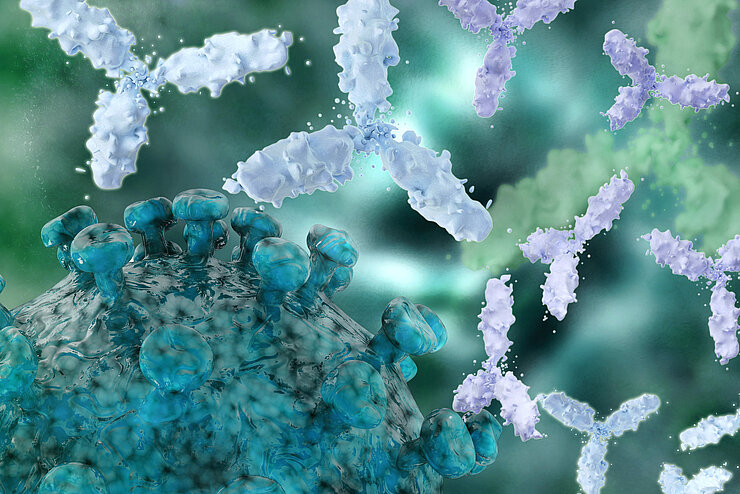
Successful fast-track-projects in research network COFONI
The COVID 19 Research Network Lower Saxony, or COFONI for short, was launched in autumn 2020. Equipped with funds from the state of Lower Saxony, the network promotes corona research at Lower Saxony institutions. In a first, accelerated round of calls for proposals, a so-called fast-track procedure, eleven projects received funding for half a year each in September 2021.
The prerequisites for funding were cross-location cooperation between the project partners and the integration of a central technology platform belonging to the network. The platform forms the logistical core of COFONI and provides all participants with comprehensive methods and animal models as well as data and biobanks for joint use. TiHo researchers were also successful in the application phase for the fast-track projects.
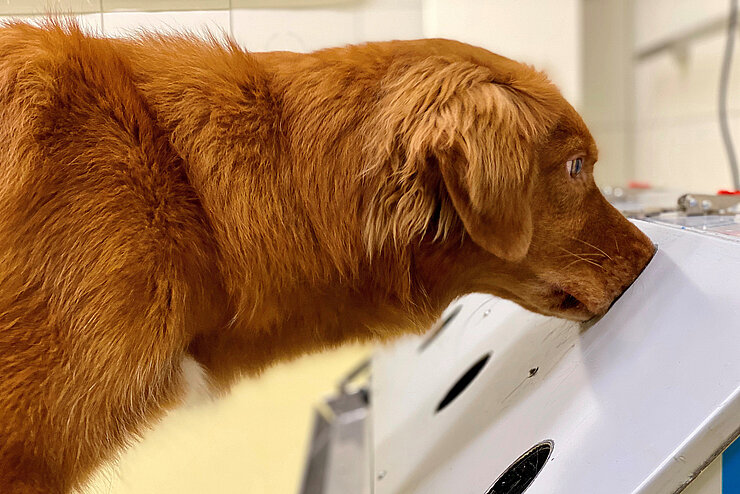
Sniffing to the corona diagnosis
Already in July 2020, scientists from the Clinic for Small Animals, led by Professor Holger Volk, PhD, published a study in which they showed that dogs are able to distinguish between saliva samples obtained from individuals with SARS-CoV-2 infection and from uninfected individuals. Subsequently, they showed that the animals can tell the difference not only from saliva samples, but also from urine and sweat samples, and that they can distinguish SARS-CoV-2 infection from other respiratory diseases. They also conducted a feasibility study to investigate the use of the sniffer dogs in practice.
Hunde können SARS-CoV-2 von 15 anderen viralen Atemwegsinfektionen unterscheiden.
Back to Culture: Können Corona-Spürhunde eine Ansteckung mit dem Corona-Virus riechen?
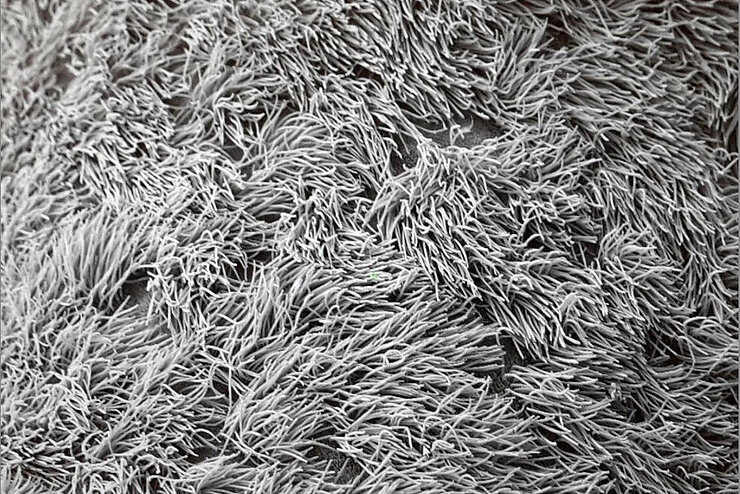
© Sandra Runft
Project ANI-CoV
Are domestic animals able to get infected with SARS-CoV-2? This question will be answered in the collaborative project "Domestic Animals as Potential Vectors for SARS-CoV-2 Transmission", in short ANI-CoV. The researchers of the Institute of Pathology of the TiHo, under the supervision of Professor Dr. Wolfgang Baumgärtner, PhD, and the Department of Infection Biology of the Leibniz Institute for Primate Research in Göttingen, specifically address in the project what happens at the cellular level in the respiratory tract of animals when they come into contact with the COVID-19 trigger.
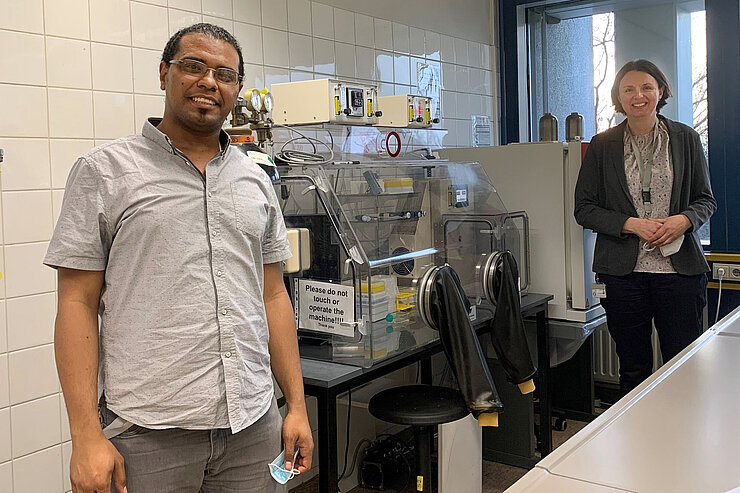
© Marianne El-Khoury
How does SARS-CoV-2 affect intestinal functions?
Ahmed Elmontaser Mohamed, PhD student from the research group of Professor Dr. Maren von Köckritz-Blickwede, wants to determine in his PhD project the molecular pathophysiology of gastrointestinal symptoms, including the effect of hypoxia, that is, oxygen deficiency, and/or viral exposure in intestinal tissue. To do this, he is using a model of permanent intestinal epithelial cells and one of induced pluripotent stem cells. To observe immune responses under reduced oxygen conditions, he conducts his experiments in an airtight hypoxia glovebox. In the hypoxia glovebox, researchers can create oxygen conditions appropriate to their experiments, for example, as in this case: an oxygen-deprived environment.
Interview with Mr. Mohamed and Professor von Köckritz-Blickwede and further information.

Research Network COFONI
The COVID-19 Research Network Lower Saxony, or COFONI for short, was founded in fall 2020 to advance COVID-19 research in Lower Saxony by pooling the strengths and competencies of Lower Saxony's scientific institutions. The knowledge of the scientists is to be used to gain new insights into the molecular basis for drug and vaccine development as well as for predicting and influencing pandemic events.
The TiHo is responsible for the key area "Pathophysiology: Immune Modulation and Control". Here, the researchers investigate the innate and acquired immune response under the influence of the two important factors age and previous diseases.
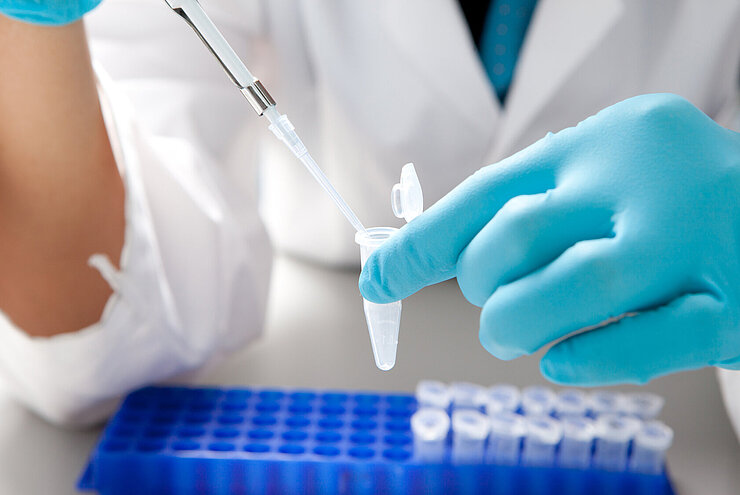
Monoclonal antibodies against SARS-CoV-2 glycoprotein.
In the project "Monoclonal Antibodies against 2019-New Coronavirus", MANCO for short, monoclonal antibodies against SARS-CoV-2 should be identified. They could be used prophylactically and therapeutically to prevent the interaction between host cell and viral membrane by targeting a glycoprotein of the viral envelope that is responsible for binding to the host cell.

Cooperation project CARE
Corona Accelerated R&D in Europe, or CARE, is a collaboration of 37 scientific institutions and pharmaceutical companies. The researchers will pool their knowledge and findings on measures for COVID-19 diseases and together develop therapies, drugs and antibodies to contain SARS-CoV-2 and be prepared for new coronaviruses.


